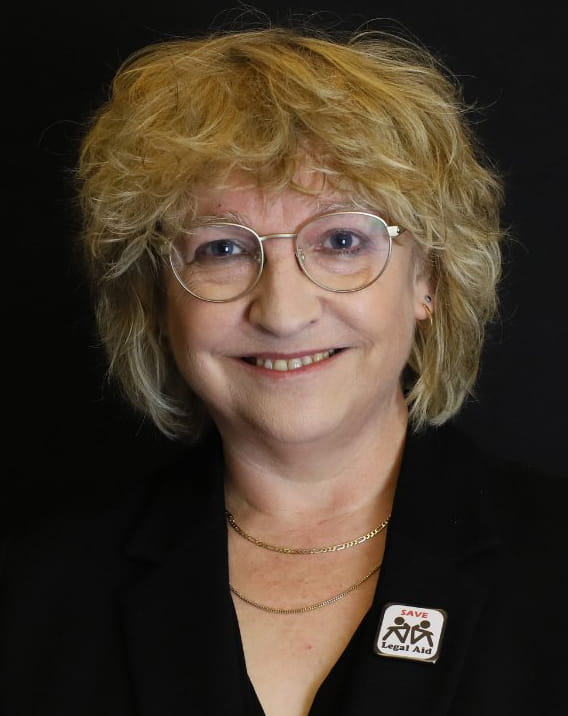Fighting for progress on domestic abuse: Q&A with Cris McCurley

Every prospective law student, experiencing doubts about their calling, should spare a few minutes to talk to Cris McCurley.
Cris (LLB Law, 1983) freely admits law was her father’s choice, not hers, but with over thirty years’ experience fighting for victims of domestic abuse, forced marriage, honour-based violence and female genital mutilation she also concedes, "There is nothing like social justice law."
Born in Fife, Scotland, into a mining community, she attributes her passion to her grandad’s mantra: "If it’s not right, we fight."
Cris co-authored the Ministry of Justice/HMCTS Family Court manual on forced marriage protection orders and safety issues, and is part of a group that has worked in Cambodia, India and Bangladesh. She is a CEDAW Shadow report writer and has given evidence at the last two enquires by CEDAW, the United Nations convention on women’s rights, when the UN have examined how well the UK Government is adhering to the UN requirements in this area.
She has won many awards and in 2021 she was voted Legal Aid Family Lawyer of the Year.

Those early years, and your family, feel like a really strong influence, even now.
“Yes, because I was brought up in such a strong mining and trade union tradition, equality and fairness were sort of in my DNA.
“My parents and grandparents saw equality and human rights as really important. They were very supportive and I grew up with a sense of really wanting justice for everybody, equality for everybody.”
Was there something in particular that really drew you to focus on domestic abuse?
“I absolutely loved university, absolutely loved it, but I felt a real ‘fish out of water’ in the law school, coming from a working class, political background.
“By the time I graduated I had more or less decided that I wasn’t going to be a lawyer, but then I started a job with Legal Action Group North East, looking at the effectiveness of domestic abuse injunctions, and as a result of that I got a placement in a local law practice. The partners there really encouraged me.
“I was in contact with a lot of people working or living in women’s refuges. This was 1984, 1985. There was so little for these women in terms of legal protection and what there was, wasn’t working. I also met a bunch of Black and Asian women activists who were really passionate about what was happening in terms of racism and how their needs weren’t being met, and so I got really interested in that aspect. As a result of meeting them, I have always really specialised in working with Black and Asian women who have been abused.”
A lot has happened since the mid-eighties. Have you seen progress in how we deal with domestic abuse?
“I’ve seen a huge amount of progress in the last year. We have had the Ministry of Justice Harm Report, the President’s Judgment in the Court of Appeal case of H-N1 - that we should move away from what are known as Scott Schedules in domestic abuse cases, and towards a trauma-based approach to domestic abuse cases - and the Domestic Abuse Bill, which is perhaps the least helpful of the three. The first two of those are significant because they’re about doing things better.”
What was your role in the first of those, the Harm Report?
“Well, two or three years ago we established a working group - women lawyers concerned with domestic abuse - and we started working with sympathetic MPs, peers and women’s organisations. We started pushing for an inquiry into what was going wrong with the treatment of victims of abuse and their children in the Family Court because we were so frustrated with the process not being effective.
“Two of us - myself and Jenny Beck - met the Shadow Justice Secretary, Richard Burgon. We organised an open letter, did a lot of TV and radio and eventually got a meeting with Paul Maynard, the Minister responsible for private family law, and he agreed to a review.
“Initially, the MoJ was hoping for a review which lasted three weeks. It became obvious very quickly that that wasn’t even going to touch the sides. It eventually lasted almost a year.
“We, and many others including High Court Judges and victims of abuse, gave evidence - both oral and written - to the review, and the outcome of that review was the Harm Report, which admitted there were terrible flaws in the way we are dealing with domestic abuse in the family courts, said why that was and what we needed to fix.
“So, it does feel like we have made progress and we could see change, and it has been great to be part of that on the policy side as well.”
While that progress is brilliant, you have obviously also had first-hand experience of the impact of reforms to legal aid. What impact have those changes had?
“God, don’t even get me started! I’ve given evidence twice at the United Nations, in 2013 and 2019, about the Legal Aid, Sentencing and Punishment of Offenders Act 2012 (LASPO), and they have found against the UK Government twice.
“After the first time - 2013 - the Government were tasked by the UN to complete a review of legal aid. We still don’t have it.
“Based on my own caseload, my main point is that migrant women must not be left behind, because we’ve seen that in legal aid, in the Domestic Abuse Act and more or less across the board in terms of cuts to services and so on.
“But getting those decisions at the UN have been really useful in our own negotiations with the UK government going forward.”
What impact has the pandemic had on domestic abuse? I suspect you will say cases have risen, but I would guess there is also the problem, because of lockdown, of abuse being hidden?
“Absolutely.
“During the first lockdown, the numbers in terms of domestic abuse were going through the roof, domestic homicides were increasing significantly, and it was also very difficult for people to get away.
“Also, at the beginning, there were no face-to-face services for domestic abuse or for child abuse or for child abduction because everyone was working from home. So, there wasn’t that ‘on tap’ support.
“Also, the pandemic has had such a dramatic impact on everyone’s mental health: I’ve worked in domestic abuse for thirty years and I’ve never experienced the level of raw, desperate emotion that our clients have been presenting with and that’s been very, very difficult to support them, to be able to do the work with them. We’ve really had to support the junior team. Some of them have found it very distressing.
“But I’ve been incredibly proud of how everyone has managed, how they have kept things going. Everyone has worked very, very hard with an awful lot of passion and commitment.”
I can hear your own passion and commitment coming through loud and clear. What would you say to a new law graduate who might be considering this sort of work?
“Well, there is nothing like social justice law, in my opinion. But I think I was very lucky, at the time I graduated – my generation had grants, we got Housing Benefit in the holidays, we didn’t pay tuition fees, there was none of that.
“I think it’s really worrying to think that legal aid may soon have had its day, because the people now coming through leave university with such enormous debt - the idea of working for not much money in a social justice practice is daunting to say the very least.
“In our own work, we put an awful lot of energy into policy – trying to make legal aid fairer, make it pay better, make it more attractive for people to take on this work.
“Domestic abuse costs the economy £66bn a year. That money is being spent on picking up things when they are broken and trying to put them back together. If we could divert some of that money into early advice, early support then we would see a much better system.
So, you have mentioned progress and frustrations. What can be achieved in the next five years?
“Well, getting back to what my grandad said, ‘If it’s not right, we fight’.
“What has happened with legal aid is not right and we need a system that reverses the impact of LASPO and pays a fair wage. Very soon we’re going to have a system that has no criminal defence at all in the UK because you can’t even break even with it. We have been seeing the growth of housing law 'advice deserts' since LASPO for the same reason.
“This is some of the most complicated law on the statute book and people can’t just be expected to manage these cases by themselves.
“The societal cost is staggering compared to the much, much smaller cost of putting the money back into the system to make it work properly.”
What role can universities play in this?
“They can get people motivated, get them angry. We’re moving to a system where the Rule of Law doesn’t actually exist.
“There’s no point in human rights, or even statutory law, if you can’t take action to improve something because you’ve got no money.
So, you have won this amazing award, Legal Aid Family Lawyer of the Year. How does that feel?
“Oh, it was just amazing.
“We’re a small community, us legal aid lawyers, and we’re getting smaller. To have been voted for by my peers, the people I respect so much, is just huge.
“Some years ago, I got the Law Society Lawyer of Year Award and that was absolutely massive. This feels so much more personal and it feels a huge boost actually, at a time when it has been really difficult for everybody in practice, and for everybody in general.”
In October 2020, Cris McCurley and Jenny Beck published a response to the Harm Report.
You can watch the Legal Aid Lawyer of the Year Awards on YouTube. Cris’ award begins at 37’17”. The ‘LALYS’ are organised by the Legal Aid Practitioners Group.


